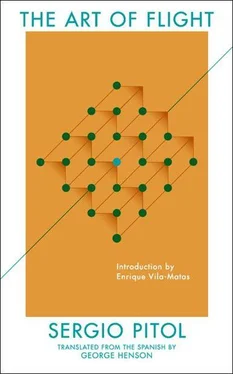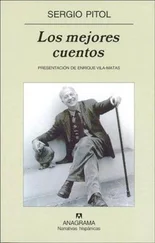Sergio Pitol - The Art of Flight
Здесь есть возможность читать онлайн «Sergio Pitol - The Art of Flight» весь текст электронной книги совершенно бесплатно (целиком полную версию без сокращений). В некоторых случаях можно слушать аудио, скачать через торрент в формате fb2 и присутствует краткое содержание. Год выпуска: 2015, Издательство: Deep Vellum, Жанр: Современная проза, на английском языке. Описание произведения, (предисловие) а так же отзывы посетителей доступны на портале библиотеки ЛибКат.
- Название:The Art of Flight
- Автор:
- Издательство:Deep Vellum
- Жанр:
- Год:2015
- ISBN:нет данных
- Рейтинг книги:5 / 5. Голосов: 1
-
Избранное:Добавить в избранное
- Отзывы:
-
Ваша оценка:
- 100
- 1
- 2
- 3
- 4
- 5
The Art of Flight: краткое содержание, описание и аннотация
Предлагаем к чтению аннотацию, описание, краткое содержание или предисловие (зависит от того, что написал сам автор книги «The Art of Flight»). Если вы не нашли необходимую информацию о книге — напишите в комментариях, мы постараемся отыскать её.
The first work in Pitol's "Trilogy of Memory," The Art of Flight imaginatively blends the genres of fiction and memoir in a Borgesian swirl of contemplation and mystery, expanding our understanding and appreciation of what literature can be and what it can do.
The Art of Flight — читать онлайн бесплатно полную книгу (весь текст) целиком
Ниже представлен текст книги, разбитый по страницам. Система сохранения места последней прочитанной страницы, позволяет с удобством читать онлайн бесплатно книгу «The Art of Flight», без необходимости каждый раз заново искать на чём Вы остановились. Поставьте закладку, и сможете в любой момент перейти на страницу, на которой закончили чтение.
Интервал:
Закладка:
For a moment some other ideas swirled around her feverish mind. She dreamt, for example, that she was the heroine of libertine novels; she smiled ambiguously as she thought of certain terribly lascivious images, but those visions did not last, and the woman returned stubbornly to the previous dichotomy. At times she trembled, sobbed, admired the courage that was needed to cloister herself in the strictest order of silent nuns and, immediately, was even more dazzled by her own erect figure, rallying from a platform of the Mutualité to a throng of workers and students, or by the feat of having chained herself to the bow of a ship that would deliver arms to Southeast Asia. But such is life. Clinging to the possibility that she would once again grace the pages of some yet-to-be-published extraordinary novel, her heart grew weak, faltered, until a sudden blow shattered it completely.
The next day, the marquise went out at five o’clock. She did it inside a modest coffin. So far, to my knowledge, no one has recorded her departure.
Xalapa, July 1994
ON RECONCILIATIONS AND THE WORD BECAME FLESH
“In the beginning was the Word,” says the Gospel of John. I do not know if that was the first, but surely it is the highest praise language has ever received. “In the beginning of all literature we find form,” declared the young Shklovsky during the second decade of the twentieth century, the brilliant theoretician from the Russian Formalist School, which revolutionized linguistic and literary studies. And around the same years, Stephen, James Joyce’s adolescent artist, will discover that “in the virgin womb of the imagination the word was made flesh.” That is to say, he sets the moment when the creation of form begins through language, the emergence of literature.
Perhaps the greatest enlightenment of my youth was the language of Borges; reading it allowed me to turn my back both on the telluric as well as the bad prose of the period. I read him for the first time in México en la cultura , the remarkable literary supplement edited by Fernando Benítez. The Borges story appeared as an illustration to an essay on fantasy literature by the Peruvian José Durand. It was “The House of Asterion”; I read it with amazement, gratitude, and boundless wonder. Upon arriving at the final sentence, I had the feeling that an electric current was running through my nervous system. The words: “‘Would you believe it, Ariadne?’ said Theseus, ‘the minotaur scarcely defended himself,’” said in passing, as if by accident, revealed the hidden mystery of the story: the identity of the strange protagonist and his resigned sacrifice. I was speechless. I never imagined that language could reach such levels of strength, subtlety, and strangeness. I left immediately to look for books by Borges; I found almost all of them, covered in dust, on the shelves of a bookstore; during those years, one could count the Mexican readers of Borges on two hands.
Literary genres and their transmigrations emerged from the union between form and language. The novel, by its mere existence, is representative of freedom; everything in it is possible provided the following elements are present: lively language and the intuition of a form. The novel is the polyphonic genre par excellence; it recognizes only the limits demanded by these two components: word and form, to which we may add another: time, a specifically fictional time. And one more: a proximity to society, its records: the never-ending round: the human comedy: vanity fair, all that.
Xalapa, May 1995
WRESTLING WITH THE ANGEL
For Marek Keller
The undersigned, a writer who vaguely sensed his vocation for literature in a sugar mill in Veracruz, also encountered — and violently so! — the dark upheaval that afflicted Tonio Kröger in Wiesbaden: the struggle between the temptation of the world and the solitude essential to the creative process. That is, a hunger for the world and at the same time its rejection. For Kröger, steeped in a tradition where, for centuries, energy and discipline have been revealed to be a mere extension of nature, arriving at the correct solution seems no longer to possess merit. The world of Veracruz, as is well known, has virtues and charms that the Germans do not know, but that makes it prone, as few are, to all sorts of temptations. To resist a desire, whatever it may be, signifies a loss, being no one, living in error. The effort to reconcile life experience with the practice of writing made me feel oppressed for many years, disorganized, diminished. Now, when the world has become smaller to me, to the point of almost vanishing, that apparent struggle has become for me disconcertingly trivial. Either way, it has left a mark on my life. It has been a source of agony, but also, secretly, the most extraordinary creative stimulus.
I try to reproduce an afternoon in Warsaw, where the fragile balance between life experience and discipline threatens to cause crisis at any moment. From the top floor of the Hotel Bristol, I watch the lively crowd that roams the Krakowskie Przedmieście, perhaps the city’s most beautiful avenue. People stop to admire the lilacs in the park beneath my room, to take some sun, eat pastries and ice cream, talk. The park’s layout is rectangular; the front, which is narrower and borders the Krakowskie Przedmieście, is civilized, a tamed garden where benches abound so that passersby can rest and mothers can watch their children run on the sandy trails. The back of the park is deep: a tangle of wild bushes, a bit of English forest, they say, where games less innocent than children’s are played. My desk is situated at an angle in front of the window. The sun illuminates my workplace from the left, as the manuals recommend.
As a rule, I would rise late, study Polish for a couple of hours, walk around town until mealtime, and, then, from four on I would sit down to work and would not leave the hotel until nine or ten at night, occupying the time preparing an anthology of contemporary Polish short stories, reading, selecting, translating, and constantly revising my translations. I would also devote time to working on a collection of stories I intended to send to Mexico. At night, I would socialize or read. While working, I would get up occasionally to make coffee, which, as a rule, I would drink on the large stone window ledge.
On the afternoon in question, the spectacle in the street and garden was both attractive and troubling. A sunny day in mid-May. The lilacs have appeared, a floral vision that is the first certain announcement of spring. The movement of the passersby is very festive. It must be Friday, when the activity is greater than any other day of the week. The heavy furs, the leather and simple wool coats have disappeared to make way for lighter clothing or trench coats. Most of the men are no longer wearing hats; the women wear hats made of straw or light fabric, adorned with small bouquets of artificial flowers. Among the young people of both sexes, one frequently sees sunglasses that protect their almost transparent blue or green eyes from the timid spring sun. On the balconies of nearby buildings, geraniums are in bloom.
During one of the breaks I devote to coffee, I see three young men enter the garden at about the same time but from different points; one is wearing a military uniform, one is obviously a university student, and the third seems, I don’t know why, to be a boy who has just arrived from the provinces to carry out a commission in Warsaw or, perhaps, determined to remain in the capital indefinitely and set in motion, like Lucien de Rubempré, the still unclear threads of his ambition and transform his will into supreme law. To be someone! What does it mean for him to reach such heights? He is very young and possesses an imagination as passionate as it is limited. To become the husband of the daughter of a Rockefeller or an Onassis, should they one day decide to holiday in Poland? Or, at the very least, marry a less famous heiress, the daughter of a Polish millionaire living in Hamburg or Chicago, the owner of a beautiful cottage on the Baltic coast? This is his plan. Indeed, he considers any other attempt to shape his future to be pointless. I can also see three beautiful girls sitting on three different benches in the garden. One, a charming blonde would justify her presence there by the fact that she works in the bookshop across the street; she’s waiting for the cashier — with whom she commutes daily on the trolleybus back to her neighborhood — to leave work; another, even more blonde, would tell whomever bothered to ask that she studies French literature and is waiting for some friends who will be there at any moment with the necessary books so they can do a translation exercise together that afternoon; the third, not as young but more attractive, with a full, perfectly shaped figure and short black hair that reveals a perfect neck, who’s wearing nicer clothes and shoes made with better materials, would say curtly that she was unable to resist the temptation to enjoy a few minutes of sun while she waits to go to a movie; she would say it in a contained, intense, and somewhat dismissive tone, which suggests a sensuality that the two blondes lack and which always causes the listener to want to divert his gaze toward the more gifted parts of her body; she would then add in a stern, almost pedagogical voice, that she’s attending an international film festival at the Skarpa cinema, without mentioning that her husband would be waiting for her there just before the function begins.
Читать дальшеИнтервал:
Закладка:
Похожие книги на «The Art of Flight»
Представляем Вашему вниманию похожие книги на «The Art of Flight» списком для выбора. Мы отобрали схожую по названию и смыслу литературу в надежде предоставить читателям больше вариантов отыскать новые, интересные, ещё непрочитанные произведения.
Обсуждение, отзывы о книге «The Art of Flight» и просто собственные мнения читателей. Оставьте ваши комментарии, напишите, что Вы думаете о произведении, его смысле или главных героях. Укажите что конкретно понравилось, а что нет, и почему Вы так считаете.












